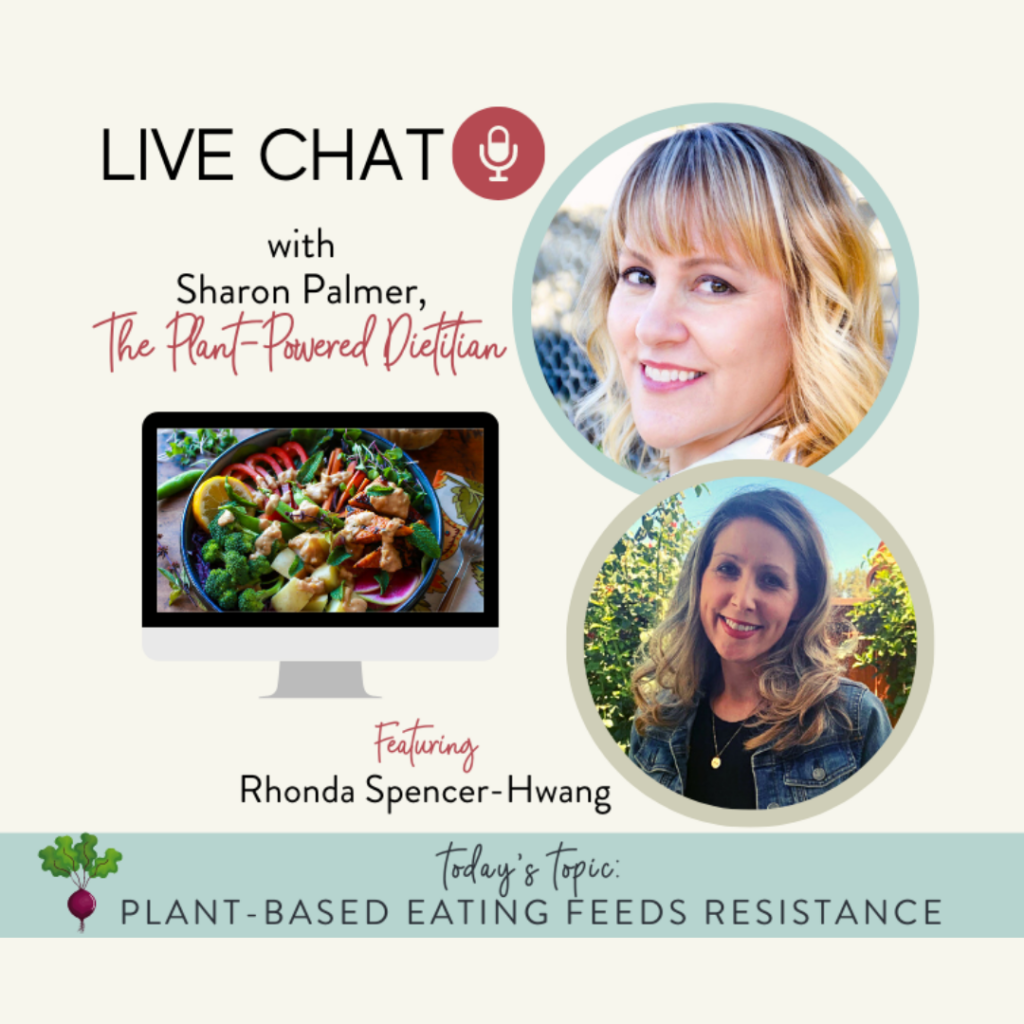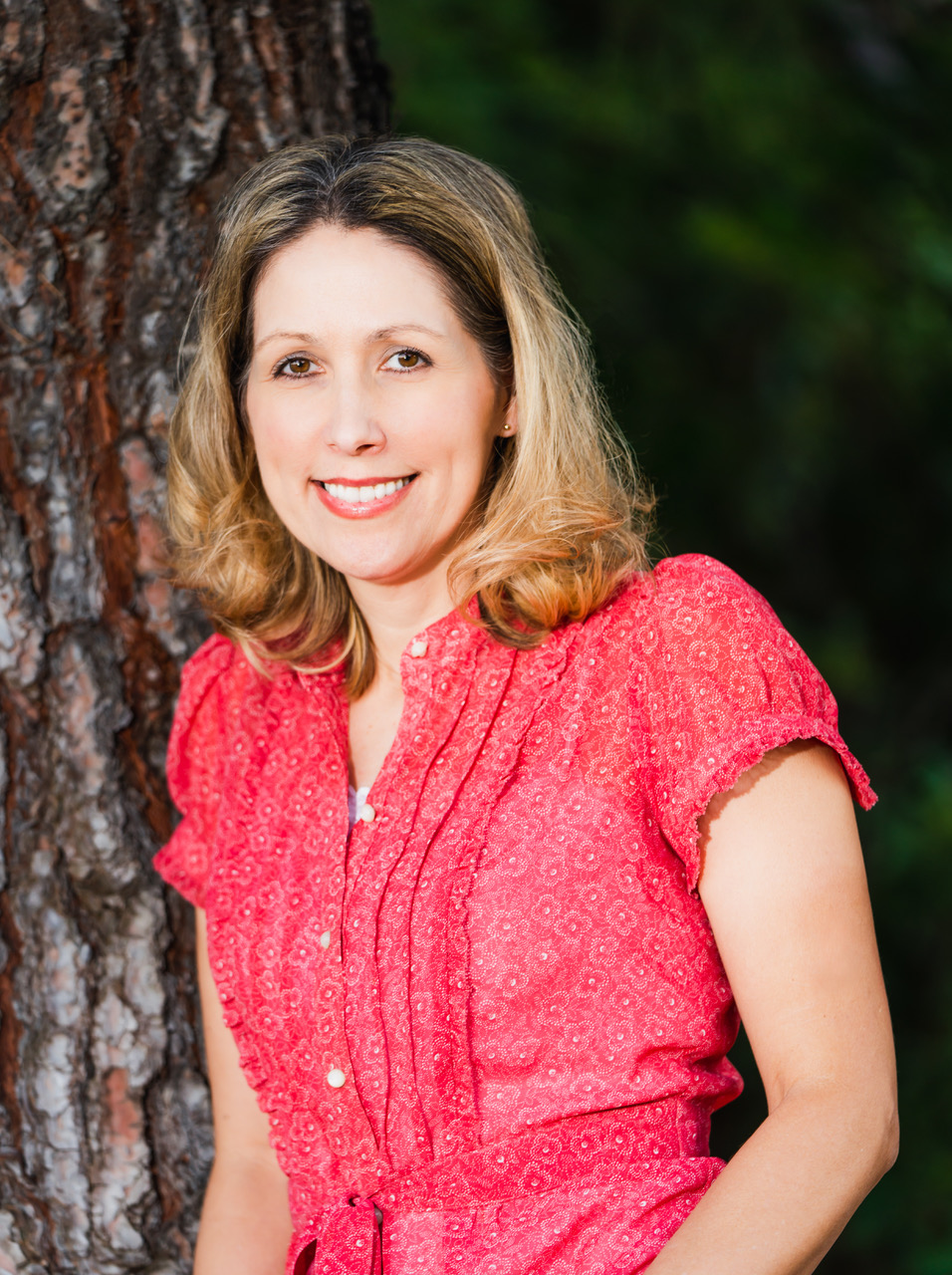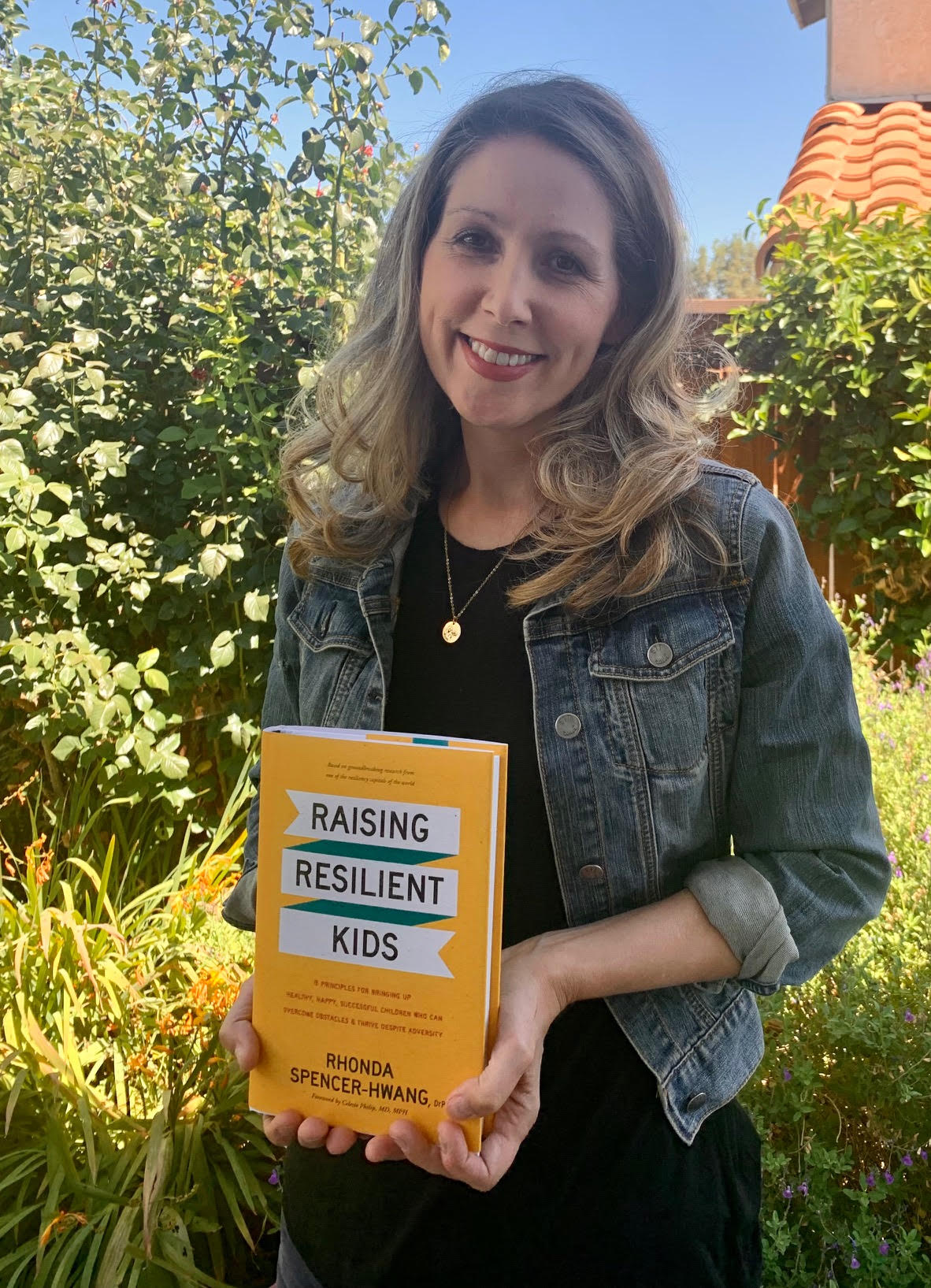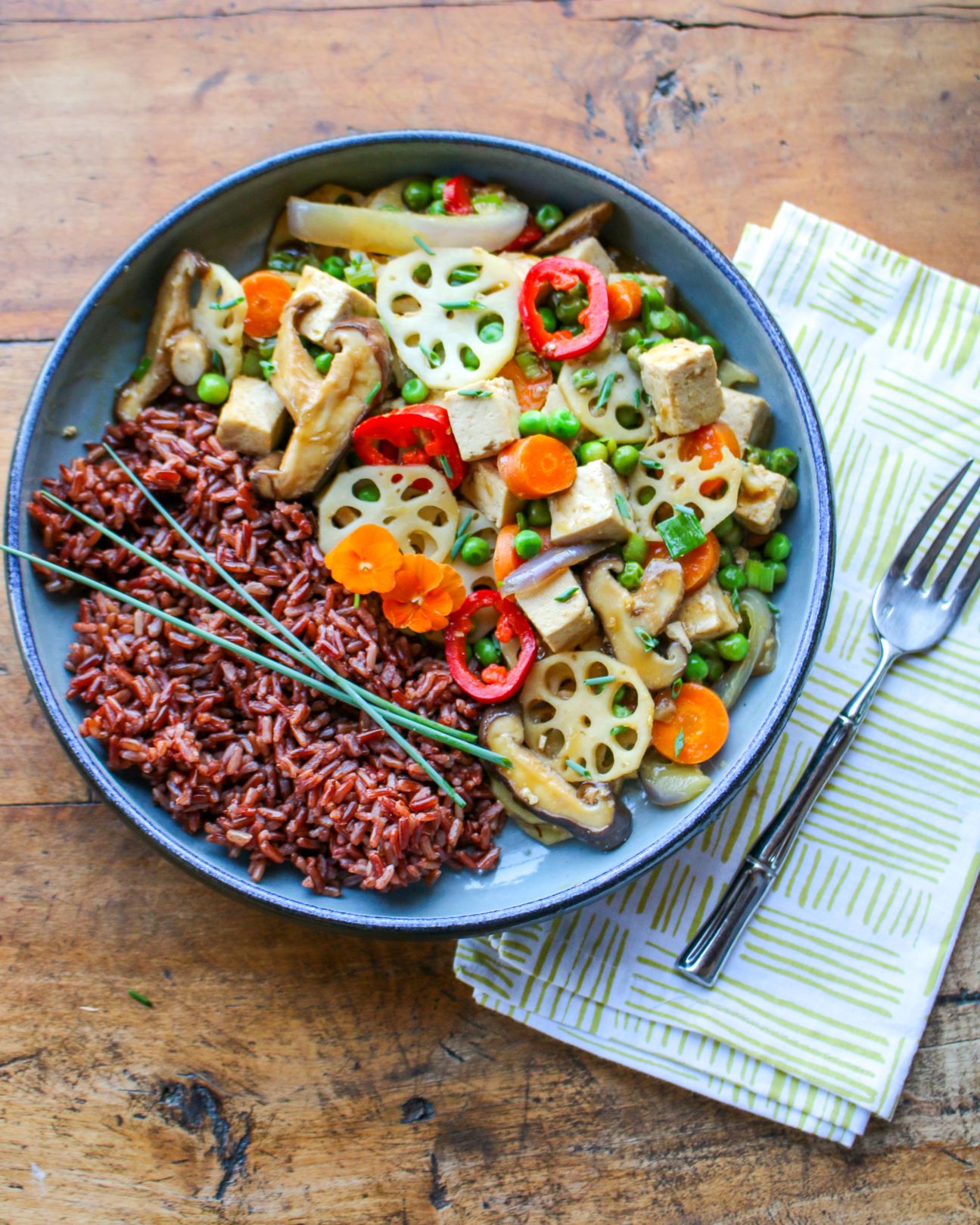Live Chat: Plant-Based Eating Feeds Resilience, with Rhonda Spencer-Hwang

Sharon joins Rhonda Spencer-Hwang, Loma Linda University professor and epidemiologist, in a live video chat as they talk about how plant-based diets can help feed resilience in health and longevity. Learn everything you need to know about the Loma Linda longevity hotspot region, and the research showing the secrets that furnish longevity and vibrance through diet.
I’m so excited to have nutrition expert Rhonda Spencer-Hwang, DrPH, MPH, CWP, Associate Professor and Epidemiologist in the School of Public Health at Loma Linda University and a consultant with the San Bernardino County Public Health Department, on my live chat today! Rhonda has been conducting groundbreaking research over the past eight years studying the habits of centenarians and is the first to identify a whole community of resilient members, despite their tremendous burden of hardships and challenges. She has studied and published extensively on resiliency and health promotion, has numerous peer reviewed publications, given presentations around the world, and is the recipient of millions in funding from various government agencies to conduct research and provide service for thousands of children and their families.

Things You Will Learn in This Episode:
- Research on how plant-based nutrition can increase resilience in health and longevity.
- The dietary patterns of centenarians.
- How plant-based eating has helped centenarians overcome hardship, adversity, and illness.
- Changes in cultural practices that impact health.
- How to develop resilience in your own health.
Rhonda’s Resources:
It was so fabulous to talk with Rhonda on my Live Chat. We had a fascinating conversation on the various factors that are related to diets and lifestyles that have been found to promote longer lifespans. You might find some surprising nuggets of information in our discussion. Listen in on the Live Chat here.
Here’s a written transcript of our live chat.
Live Chat: Plant-Based Eating Feeds Resilience, with Rhonda Spencer-Hwang
Q Tell us a little bit about your journey, and what led you to this work in public health and nutrition?
A My journey is somewhat an unusual one. I’m an epidemiologist and professor and I’ve also had a number of grants from the government and First 5, doing health promotions programs for children and their families. Well meanwhile my own life was very hectic, a career mom, and I have 3 kids and my youngest at the time was 1. Here I am running around. My purse was a buffet of snack food items and every electronic device under the sun, you name it I had it. I just had this heap of stress and guilt because of the choices we were making. My husband had been diagnosed with high blood pressure and high cholesterol, though we exercised every day pretty much and we tried to eat well, but our choices were not great. My son’s pediatrician said that his weight was creeping up. My own cholesterol was starting to show signs of not being so healthy. So I thought that I really wanted to do something different. We have people coming all over the world to see us here in Loma Linda, where we have this fountain of youth, this community of longevity, and so people are coming here. A film crew calls me up asks me if they can come and see what my pantry looks like. It would take me a good week to prepare so that we would have this look. Part of me knew, I needed to do better. So then I decided to interview centenaries and see what advice they have for families and children and about how should we be living differently. I never knew I’d be running around tracking people who are over 100. And I never imagined at the time, 8 years ago, that the pandemic would be a thing. Physicians were wondering, why are you interviewing centenarians and what possible advice do they have for us, they lived a 100 years ago? In my gut, I had a feeling that divine intervention was calling me to do this research. Moms were calling me to make a book and so I did. I made a book about my research and journey. My journey was life-changing, a different perspective and a different way of living, better health and numbers are decreasing. I have to say happiness and joy overall in my household. We still have fights with the kids, but it’s a more peaceful time now that I’ve made the switch and live differently.

Q In a nutshell, what did your research on public health reveal to you?
A So I decided to work on a full qualitative research study. I had a team of volunteers join me to track down centenaries. With a developed survey, we went out to track down centenarians. From my previous job, I was an epidemiologist that tracks infectious diseases, so I have no problem finding people, especially those that don’t want to be found, I know how to track them down. We started with my husband’s aunt, she’s the oldest in Loma Linda. At the time she was 101, now she’s 108. At 101, she was still living independently. At 100, she was still driving her own car. It has been an amazing journey meeting these guys. They are everything that you can imagine from a heart surgeon to one in pathology. The pathologist graduated medical school at a time when women weren’t graduating medical school. We’ve had people who are world record setters to even just typical housewives and farmers, everything in between. We had tape recorders and interviewed them. We transcribed the interviews, then coded them and were looking for themes. What are those themes that are going to come out that look like what I call resiliency factors? That thing that would likely would offset anything in their life?

Q Did anything about your research surprise you?
A The big surprise to me was the trauma, I wasn’t expecting that. I wasn’t expecting the asymptomatic level of trauma. I wanted to make a survey so I would see what their life looks like and then I can compare my own life to what a centenarian would look like. That was really eye-opening. I encourage people to take the survey if they want to see what resiliency looks like when you compare it with those people who have it the most. That is kind of like a humbling experience, especially if you’re in a public health profession where you’re a registered dietitian to see where you are stellar at and where you could use a little help out. And so that’s what I did and it was really eye-opening, and you know of course one of mine was food. One of the principles of the centenarians under the simple foods habits was no food on the fly. If you looked in my car, it’s stocked as a mobile food unit, I’ve got napkins, straws, you know it. That was that was when I really wanted to begin taking it to heart and slowing down and I know it’s hard but even starting 1 day a week where you gather around the table. I have a saying that I say to my kids is that “hunger is not a requirement to come to the table”. You don’t have to be hungry to come because there is more going on than just the feeding of the body, there is the feeding of the mind and soul and connecting with the family.
Q What did you learn about the dietary habits of the centenarians which makes them so resilient?
A One of the things that makes food taste much better is hunger. I know there is a good intention, but in the sport activities that my kids are involved in, there is always a snack. I was thinking after sports, you don’t have to give them a bag of chips. By the way, the only option that centenarians had to drink was water. There wasn’t Gatorade, coconut water, or infused water. I’ve noticed a lot of the schools in the pandemic that offer chocolate milk or apple juice. Why don’t they give out water? The centenarians were poor, so it is what they grew that they ate. Now we have many options. It’s really the consciousness of the parents. We have a plethora of options, more than what the centenarians had. In one of the studies that I looked at, among children who are abused, there is this level of inflammation that is creeping up. One of the keys to offsetting that damage of inflammation is attacking that level of inflammation. The inflammation comes from everywhere, not just stress. It starts in childhood, so the sooner you eat plant based, the better you’re able offset the inflammation.

Q Why do you think eating this way helped them overcome hardship, adversity, illnesses and so much more?
A There is a study in the British Medical Journal that found that healthcare workers who eat a plant-based diet have less and moderately severe covid cases. For me, one of the things that I’m curious about is the overlap. I say the ease and overlap of powers is the synergy. They have studies that show your stress and cortisol levels drop within 10 minutes of just being outdoors. Your hydration is also linked to your immune system. All of these things are building a kind of life preserver and layers and layers to offset the trauma. Getting back to the way that centenarians worked the soil to grow their food and eating it together; I think all of that magnifies the benefit. There’s what we call effect modification where these things interact and where they have even more protection than if you all you did was just one of those things, it’s great but I think that it magnifies benefits. So I think that’s the next step is looking at the holistic.
Q Why do you think our cultural practices have changed so much from what the centenarians practice? And how do we find our way to reconnect?
A The keystone habit that really influences a lot of the others when they were kids is that time in nature. Time in nature from growing their own food to walking everywhere. To get to school it would take them an hour. Everything took twice as long. We think of growing a garden, ordering the seeds, they had none of that. It was very demanding and different. I think about using our own feet. Thinking back, and saying, okay how can we simplify our life? The keystone habit was time and nature and it was very much outdoors and helping one another. I think we kind of lost that way. Today is very hectic and fast-paced. There is this feeling amongst parents from helicopter parenting, bubblewrap parenting to orange jumpsuit parenting. One of the things I encourage parents, if you want to make a change first do a study of your life. First take the time to do a study of your life, write down what you’re doing, what you’re eating, and who you’re with. Then call in one day, take a happy day from work, a sick day. Most of us really are sick, we just can’t see it. Start to evaluate your time diary. Is it how you imagine your life to be? Does this bring you joy? Does it make you happy to see you or your family in this way? Is this what you wanted? If the answer is no I want to make changes well then you have to start right then and there. Part of me, I prayed and asked God for guidance to help me make my family stronger. Then take the survey in the book and see which resiliency factor you know you’re kind of blowing; then walked through the step-by-step program to see which things you’re going to do well in. Some things you’re going to get that are not a problem, and then others you’ll need help in. So I say use your strength to bolster up the areas that need it. If you don’t like to garden, maybe you like to walk. Then you can walk to the store to get the food that rots. Pick up the foods your great-grandma would recognize, if not don’t fill your cart with those things.

Q What has been the hardest centenarian habit for you to practice with your own family and why?
A I had a fear of the kitchen, that was kind of my background. I didn’t grow up cooking. I jumped in and I was going to do this. I used to burn all the foods I cooked. So I started ordering those meal kits such as Blue Apron and Hello Fresh. After doing that for about a year, I really feel good about the skills that I’m learning, so that was kind of from the box. I supplement because I have teenagers now. We picked the plant-based or the fish. It’s really helped me to gain skills of what things are called and for the different spices. It’s given me a lot of confidence to go out and shop and try new recipes. So that’s what I recommend.
Q What advice would you give listeners on how to develop resilience in their family during crises such as the pandemic, natural disasters, economic downturn…etc, especially around food and food habits?
A One is around the foods and about how you stock your pantry. I learned this early on and before my pantry was a mess. Also connecting with family and friends. If you’re always purchasing things that are nice, you’re going to have to work more to pay for those things. So they really taught me the value of simpler and slower. Protect your schedule, it shouldn’t be jam packed. When you have some free time, that’s when the best memories are made.
Rhonda shares one of her favorite plant-based recipes, Butternut Squash Enchiladas.
Butternut Squash Enchiladas
Ingredients:
- 1 butternut squash, peeled, seeded and cut into ¼-inch x 3-inch sticks
- 1 medium white onion, cut into long slivers, ¼ inch thick
- 1 red bell pepper, seeded and cut into ¼-inch strips
- 3 tablespoons vegetable oil
- Salt and pepper, to taste
- ½ cup vegetable oil
- 12 corn tortillas
- 12 ounces red enchilada sauce
- ½ cup queso fresco, crumbled
- Cilantro, chopped
Preparation:
- Preheat oven to 375°F.
- Toss the squash, onion, and bell pepper in 3 tablespoons oil to coat. Then sprinkle on salt and pepper to taste.
- Roast vegetables in hot oven for 20 minutes until they are soft and beginning to brown.
- Heat ½ cup oil in a small skillet on medium or medium low. When the oil is ready, dip each tortilla in the hot oil for 10 seconds per side.
- Fill each tortilla with squash, onion, and bell pepper, then roll and align in a casserole dish.
- Pour the red sauce over the enchiladas, being sure to cover/soak all the edges.
- Bake 20–25 minutes until heated through.
- Garnish with queso fresco and chopped cilantro.
About Rhonda:
Rhonda has over 20 years of work experience as a public health professional engaging and educating the public in health promotion activities and now is a debut author with her book (Raising Resilient Kids by Tyndale Publishing House). Through the lens of an epidemiologist and as a parent, she shares the wisdom of the centenarians, along with step-by-step guidance, strategically equipping families for thriving in the face of whatever life throws your way. In addition to her teaching, research, and service work, Dr. S-H enjoys spending time with her husband and their three children (Jayden 16 yrs., Joelle 13 yrs., and Julia 6 yrs.) at their home in Loma Linda, CA. Her husband’s great aunt is one of the centenarians interviewed, and recently celebrated her 108th birthday—a super centenarian. Ultimately, Dr. S-H’s work is inspired by her family and desire to promote a culture of health for our nation.
For other Live Chats with Sharon, check out the following:
Live Chat: Biodynamics with Thea Maria Carlson
Plant-Based Eating for Kids with Alex Caspero and Whitney English
Learning About Cultural Humility In The Food System With Denine Rogers
To learn more about the Blue Zones, check out this blog.
To learn more about plant-based eating, check out my tips:
6 Tips for Boosting Protein on a Plant-Based Diet
Top 15 Tips for Powering Up on Vegetables
10 Essential Plant-Based Cooking Tips


